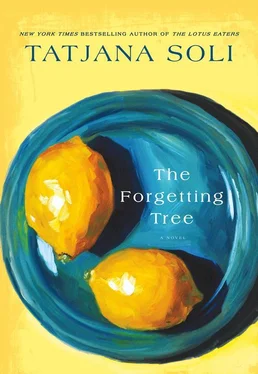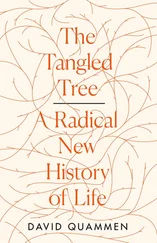Tante Josie took over cooking the meals in the pink house on the hill. She did not want to lose the good wages, but Tante was not a chef like Maman, she used too much salt, every dish came out bitter, and she knew her days were numbered, so she looked around and bartered the sweet, not her own dear daughters, non, but Marie, now fourteen, up to the house. No more time for English classes or reading either, but the white-curled lady never raised a question, turned her cataract-clouded eyes to the wall, because nothing could be truly spoiled if it wasn’t English first.
Tante had her mop the floors, rub lemon oil deep down into the grain of the wood, but mostly she left her in the greenhouse on long afternoons, alone in a babyish, white crocheted dress and frilly pink panties, alone with the old lady’s son, a man with his own hair gone salt and pepper already, because the sweet of their same family blood didn’t matter to Tante .
* * *
Another village by another name, where Maman had taken her for fresco, ices, but now where the man-on-the-hill took her when he wanted more privacy than the greenhouse allowed. First, he sat in the bar and had a beer, talked with the men while she sat outside on a chair or crate or, if there was no room, on the curb where her legs would get dusty. Sometimes he sent a Pepsi out. Then he rented a room in the town’s only hotel, but this was no news since he had rented rooms there many such times, so the only gossip was adding Marie’s name to the long list of ruined. She felt light-headed with dread. A small room, bare, except for a wobbly table by the window, one chair, which he sat on to untie his shoes, and a bed barely wide enough to hold one weary body.
The man-on-the-hill was kinder when he was away from his large pink house and his fancy people. He showed a definite tenderness toward those he would use. His face was soft and pink like the belly of a pig. Marie looked down at his bare feet, the toenails thick and yellowed. He pinched her earlobe between his thumb and forefinger as he ruined her the first time, so that she wouldn’t feel the true pain. “Marie, Marie, Marie,” he whispered in her ear till she grew to hate the sound of her own name. He made her whisper back his name and the English words his mother had so carefully taught her. “Edward, Edward, Edward.” The rain in Spain stays mainly in the plain . Afterward, he pulled out a small pair of gold-plated scissors and cut out a section of the stained sheet, which he neatly folded and put away in his jacket pocket. Marie pictured a wooden box filled with the scraps of other girls. While he smoked, he ordered her to strip the rest of the bed and bundle it for laundry, treating her as maid, as if the act were simply another service provided by the hotel.
* * *
When Marie started throwing up in the mornings, Tante took her down to the curing shed where the coffee beans dried. She worked a metal wire between her legs and that was the end of that. So much blood, maybe this would be her end … the floor stayed red no matter how many times she made Marie wash it afterward. Tante Josie stood by and smoked down her cigar. “Shame on you,” she said. “You bouzin . At least there won’t be babies.” That was the first time Marie felt herself grow strong by hate. Tante let Marie stay home that afternoon, resting on the porch, while she brought her cup after cup of coffee to fortify her blood. By now, Marie knew better than to mistake this for kindness; Tante was protecting her investment.
* * *
After a time, maybe two years, the man-on-the-hill was done. The white-curled lady lay dead in the weed-covered foreigners’ graveyard. She would never make it back to her England or know the wickedness the island had allowed to fester in her son. Now he only wanted fresh goods, Tante , with her pebble eyes, said to Marie. Josie was a regular businesswoman bartering with Marie’s body. Next she offered the girl to man-on-the-hill’s son, a pimply boy scared of his own shadow. Then after, to his friends, until after a time it didn’t matter to Marie anymore — what was Marie was gone like a kite after the string snapped.
As Marie was handed down, there was less and less kindness, as if the thing that had been done to her were simply a fact of nature or self-inflicted character. As if she had been born ruined and was maturing into it. Soon not even shabby rooms were rented, but dark alcoves, hallways, stinking alleyways. Taken for granted that she was what they saw before them, had always been that, and nothing else. Treat someone as if they’re worthless, soon they believe it. By the time Marie got to the woman in Port-au-Prince, even Tante Josie pretended away her part and blamed the girl for her state.
* * *
After the men in the village were through, Tante cut a bargain with the woman who ran girls to Port-au-Prince. A regular establishment of whoring. Marie packed a kerchief and boarded a tap tap for the capital, a reverse of her maman ’s escape. When Tante Josie and her daughters waved good-bye, Marie turned her back.
* * *
Although Marie had not seen Jean-Alexi again after the beach encounter, she had heard talk of him through the village gossip. From small-time criminal and drug dealer in the village, he had been recruited by the local Macoutes to turn his attention from cruelty to things to cruelty toward men. He “disappeared” some of the men who were making trouble for local politicians collecting taxes. For his appetite for ruthlessness, he was rewarded with a Jeep, an Uzi, and a few acres of land. These he quickly converted to cash to buy drugs, doubling his wealth. At about the time Maman was murdered, Jean-Alexi was on his way to the capital to continue seeking his dark fortune. Unlike Marie a few years later, he did not go empty-handed or without connections.
Madame Zo, Madame Bones, the woman Tante sold her to, was impatient as she met the tap tap . “You are late, stupid girl.” It was dark already, the noise and crowds of Port-au-Prince overwhelming to a girl from the country. But Marie remembered the happy stories Maman had told her of her younger days there — could life get any worse than it had been in the countryside?
Madame Zo walked her to the edge of the park, what she later learned was the Champs de Mars. “Get in a few customers before we go home.” Marie was dirty, hungry, and tired. The walkways around the grass and trees were crowded by the dark shapes of other girls, and each time a man passed by, voices moaned and pleaded. Marie hung back against a building, her sack of belongings clutched over her chest, till Madame Zo found her. “Nothing? Too much to hope for.”
She held on to Marie’s hand and marched her through the nightmare of La Saline. Marie had never imagined such a way of living because, although they had been poor, there had always been space; here there was none. They wound their way through a maze of narrow, dirty passageways, a chaos of noises and smells, and all she could think was how she would escape. Sanity would be when she was back in open spaces, back under her sacred trees. They came to a rusted-iron, padlocked gate. The house was built of plyboard, supported by leaning on its neighbors; the roof was corrugated iron that in the rain dripped puddles of orange rust. In the alleyway, a dozen girls lounged on low plastic stools in various states of undress. A few listened to calypso on the radio, a few played dominoes. None of them bothered to look up at Marie’s arrival.
“You don’t work here — you do your business in the park. This is home,” Madame Zo said.
Some of the girls snickered. Home was the size of a large closet, and thirty to forty girls were to call it their place of living. No matter where Marie rested, she pressed against other bodies. At night they slept dòmi kampe, what they called stand-up sleep. The first girl in rested against the wall, padding her cheek with an arm or a piece of clothing. The next girl came and rested against her, so on and so on, until the last packed herself against the opposite wall, sometimes seven or eight bodies thick. When they were in tight enough, one could relax, held up by others, and not fall down. At first the contact repulsed Marie, used to the luxury of space in the village, but after a while her insides grew so lonely, the contact comforted. It didn’t much matter which girls she leaned against, they were all sisters in misfortune.
Читать дальше












